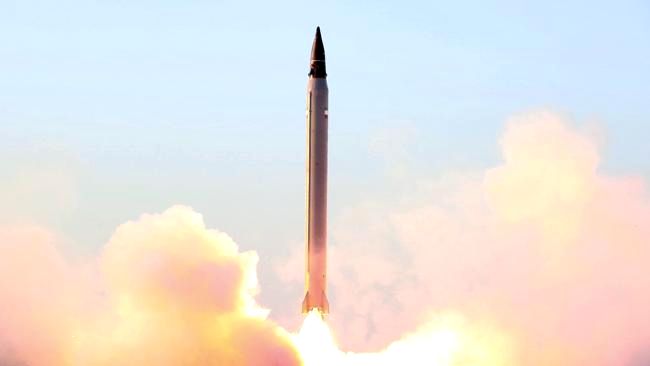The Islamic republic is remaining defiant amid a threat by the US to impose tough new sanctions on its ballistic missile program.
A top Iranian official wrote on Friday that Tehran will develop missiles with a range of 5000km — if the US sanctions are imposed.
“Iran has dismantled thousands of centrifuges to prove its right for enriching uranium. The new sanctions come as a slap to our country,” wrote Expediency Council Secretary Mohsen Rezaei in an open letter to President Hassan Rouhani, according to Iran’s Mehr news agency.
“The US will regret its behavior and realize that such actions cause no benefit,” Rezaei stressed.
The advanced missiles could pose a threat to Camp Thunder Cove, a small isolated US air base in the Indian Ocean, according to the RT news agency.
The threat comes after a senior commander claimed Iran’s Revolutionary Guards have so many missiles they don’t know where to hide them.
“We lack enough space in our stockpiles to house our missiles,” said General Hossein Salami, the Guards’ deputy.
“Hundreds of long tunnels are full of missiles ready to fly to protect your integrity, independence and freedom,” he told worshippers in Tehran, promising to never “stop developing our defence deterrent”.
Iranian state television aired in October unprecedented footage of such an underground missile base.
The general’s comments came after reports that the US had planned — but later shelved — to unveil a fresh round of sanctions following two recent missile tests by Iran.
The mooted financial penalties on companies and individuals in Iran, Hong Kong and the United Arab Emirates, for apparent links to Tehran’s missile program, highlighted worsening US-Iran relations.
They also put in jeopardy a landmark deal struck in July between Iran and six world powers including the US, which is due to be formally implemented within weeks.
Iran’s President Hassan Rouhani denounced the US moves Thursday as “hostile and illegal interventions” that must be met with a response.
He ordered the military to intensify its missile development and take whatever steps necessary to start new programs if they would better serve Iran’s defence.
After Rouhani’s comments the White House put the sanctions on hold indefinitely, The Wall Street Journal reported, though officials said the measures remained on the table for use if necessary.
The spectre of new penalties against Iran — the nuclear deal is due to lift existing sanctions that froze Iran out of the global financial system and crippled its oil exports — brought worsening relations to a head.
A United Nations panel last month said the two missile tests breached previous resolutions aimed at stopping the Islamic republic from developing projectiles capable of carrying a nuclear warhead.
Iran has always denied seeking an atomic weapon and argues that its missiles would never be designed to, nor ever carry, such a bomb.
The nuclear deal is due to come into effect on “Implementation Day”, expected later this month, or soon after, when UN monitors sign off that Iran has applied major curbs to its atomic program.
/149

